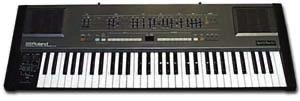
Roland Juno 106
128 New Analog Sounds
Only $25
Available in WAV File Format.
Sounds load through the Data Cassette Port.
Roland released the Juno-106 in 1984 and seemed to be taking a step backwards from it's predecessor, the JX3P. While the JX3P had two Digitally Controlled Oscillators, the Juno-106 with it's single DCO was almost exactly the same as the Juno-60. The only major difference between the Juno's was that the Juno-106 had MIDI built in, but It was a complete MIDI spec - rare for any synthesizer of the time, especially analog synths. Most control surfaces on the synthesizer were capable of transmitting and receiving MIDI SysEx commands, allowing complete control of the Juno from a sequencer or computer. The Juno 106 also increased the memory to 128 patches from the 56 patch memory in the Juno-60.
Like the Juno-60, the Juno-106 is incredibly easy to use and is a great tool for anyone interested in learning about programming synthesizers. Everything is right in front of you on the front panel and all you have to do is start fiddling with the sliders and switches. Due to it only having only a single DCO, the Juno is somewhat limited in the amount of sounds it can produce. For this reason, unlike many other analog synths from this period, you can still pick up a used Juno-106 for a very reasonable price. However, the Juno is great at producing great synth bass and leads as well as warm pads and cool filter sweeps and is still sought after in the used instrument market. Roland also produced the HS-60 for the consumer market, which is essentially a Juno-106 with built in speakers.
The Kid Nepro Juno-106 collection is available as a WAV file. To load the WAV file, just connect your computer audio output to your Juno-106 cassette interface and you can load in the sounds the same way you would from a cassette tape. The files will open in any program that plays .WAV files - including iTunes. Our sounds will also get you back in business if your Juno's battery has died and you lost all the sounds in the memory



Roland HS-60
